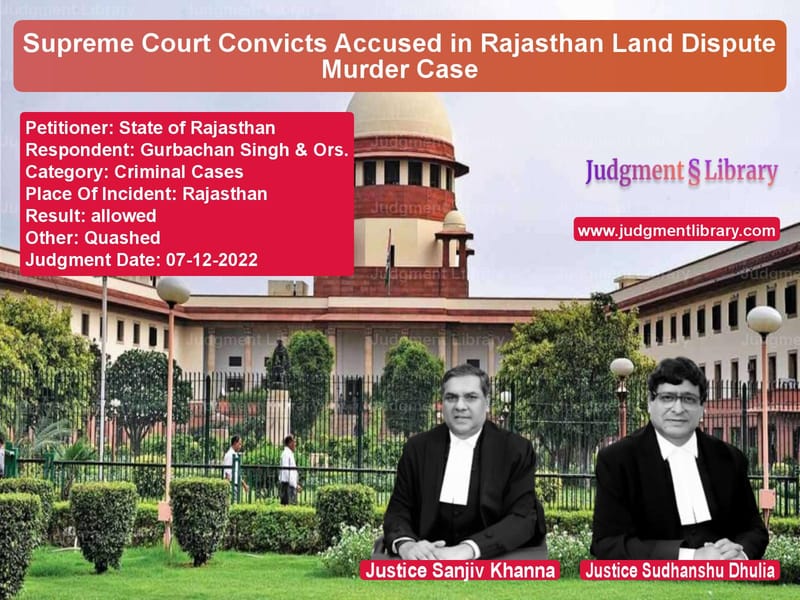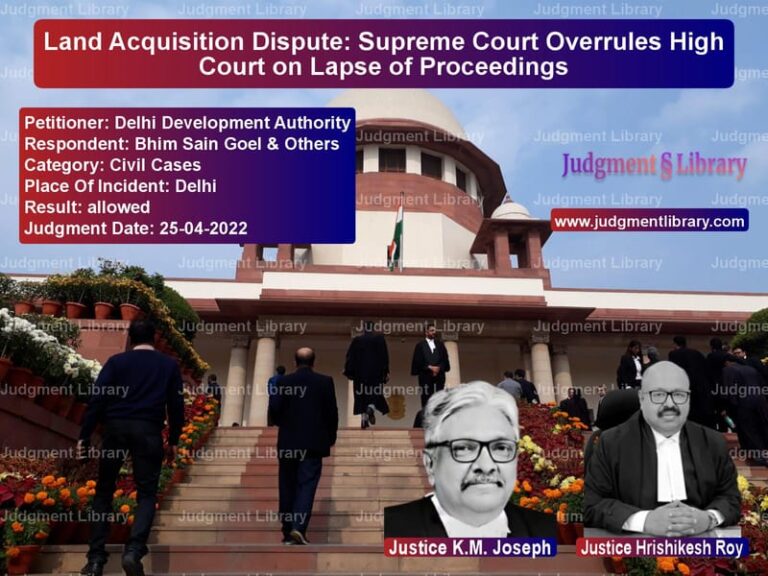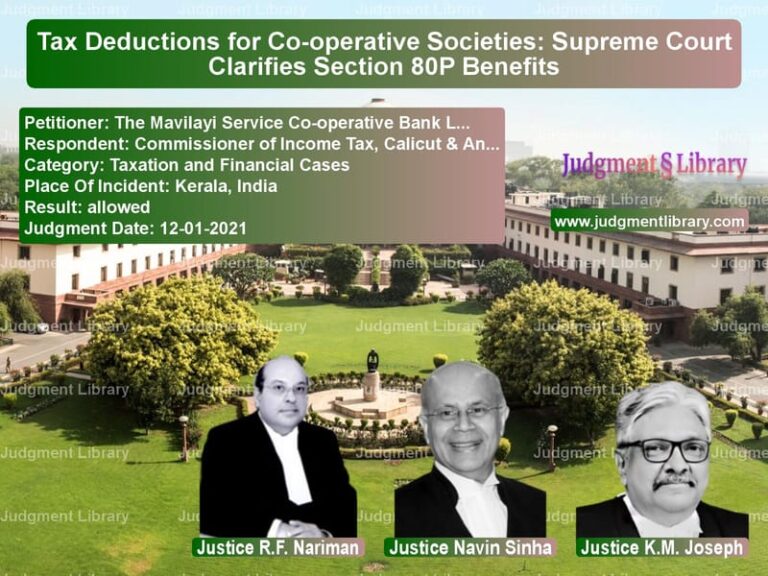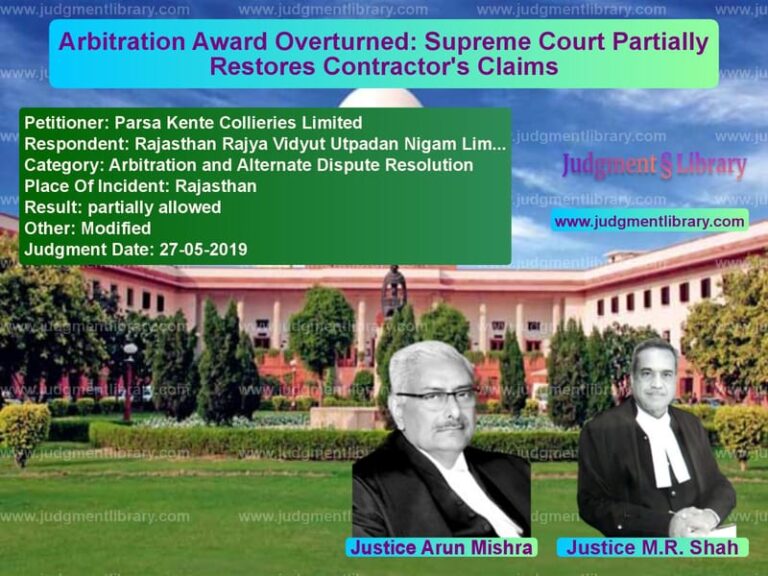Supreme Court Convicts Accused in Rajasthan Land Dispute Murder Case
The Supreme Court of India recently ruled in the case of State of Rajasthan vs. Gurbachan Singh & Ors., overturning the Rajasthan High Court’s decision and convicting one of the accused in a brutal land dispute murder. The case revolved around the killing of Teja Singh, who was attacked by multiple assailants over a property dispute.
The judgment reinforces the principle that an accused who participates in a crime with shared intent is equally liable for the consequences, even if the actual lethal blow was delivered by someone else.
Background of the Case
The case originated from a land dispute between Teja Singh and his relatives, including Gurbachan Singh, Balveer Singh, Manjit Singh, and Darshan Singh. The dispute turned violent, resulting in Teja Singh’s murder.
The key events leading to the case were as follows:
- November 6, 2000: The victim, Teja Singh, was attacked near a Gurudwara in Rajasthan by Gurbachan Singh, Darshan Singh, Balveer Singh, and Manjit Singh, who were armed with a lathi, toka (sharp weapon), axe, and gandasi (sharp weapon), respectively.
- November 6, 2000: Teja Singh succumbed to his injuries at the spot.
- November 7, 2000: FIR was registered, naming all the accused.
- November 7, 2001: The trial court convicted all accused under Section 302 read with Section 149 IPC and sentenced them to life imprisonment.
- April 4, 2008: The Rajasthan High Court acquitted one of the accused, Gurbachan Singh, and modified the conviction of others.
- December 7, 2022: The Supreme Court overturned the High Court’s decision, convicting Gurbachan Singh under Section 302 IPC with Section 34 IPC.
Arguments by the Appellant (State of Rajasthan)
The State of Rajasthan argued:
- Gurbachan Singh actively participated in the attack and shared common intent with other accused.
- The High Court erred in acquitting Gurbachan Singh despite clear evidence of his involvement.
- The trial court’s judgment correctly applied Section 149 IPC (unlawful assembly) in convicting all accused.
- Gurbachan Singh’s role, even if limited to striking with a lathi, contributed to Teja Singh’s death.
Arguments by the Respondent (Gurbachan Singh)
Gurbachan Singh countered:
- He only had a lathi and did not deliver fatal blows.
- The High Court correctly found that he did not share common intent with others.
- His participation was limited, and he should not be held liable for the murder.
Supreme Court’s Judgment
The Supreme Court ruled in favor of the appellant, holding:
- Gurbachan Singh actively participated in the attack, making him liable under Section 34 IPC (common intention).
- The High Court erred in acquitting him, as his role was essential in the assault that led to the victim’s death.
- “An accused cannot escape liability merely because he did not deliver the final blow.”
- The conviction of Gurbachan Singh under Section 302 read with Section 34 IPC was restored.
Key Precedents Cited
The Supreme Court relied on multiple landmark cases, including:
- Gurpreet Singh vs. State of Haryana (2002): Affirmed that common intention must be inferred from participation.
- State of Rajasthan vs. Balveer Singh (2016): Held that an accused need not deliver the fatal blow to be convicted of murder.
- State of Madhya Pradesh vs. Lallu (2019): Reiterated that common intention is a matter of inference from facts.
Impact of the Judgment
This Supreme Court ruling has significant implications:
- Reinforces the principle of common intention: Establishes liability even if the accused did not strike the fatal blow.
- Prevents selective acquittals: Ensures that all participants in a crime are held accountable.
- Strengthens justice in group assaults: Provides legal clarity in cases involving multiple attackers.
Conclusion
The Supreme Court’s ruling in State of Rajasthan vs. Gurbachan Singh & Ors. ensures that all participants in a violent crime are held accountable. The judgment upholds the principle that common intent plays a crucial role in determining liability under Section 302 read with Section 34 IPC.
The verdict sets an important precedent for future cases involving group assaults and land dispute murders, ensuring justice for victims and upholding the rule of law.
Petitioner Name: State of Rajasthan.Respondent Name: Gurbachan Singh & Ors..Judgment By: Justice Sanjiv Khanna, Justice Sudhanshu Dhulia.Place Of Incident: Rajasthan.Judgment Date: 07-12-2022.
Don’t miss out on the full details! Download the complete judgment in PDF format below and gain valuable insights instantly!
Download Judgment: state-of-rajasthan-vs-gurbachan-singh-&-or-supreme-court-of-india-judgment-dated-07-12-2022.pdf
See all petitions in Murder Cases
See all petitions in SC/ST Act Case
See all petitions in Judgment by Sanjiv Khanna
See all petitions in Judgment by Sudhanshu Dhulia
See all petitions in allowed
See all petitions in Quashed
See all petitions in supreme court of India judgments December 2022
See all petitions in 2022 judgments
See all posts in Criminal Cases Category
See all allowed petitions in Criminal Cases Category
See all Dismissed petitions in Criminal Cases Category
See all partially allowed petitions in Criminal Cases Category







